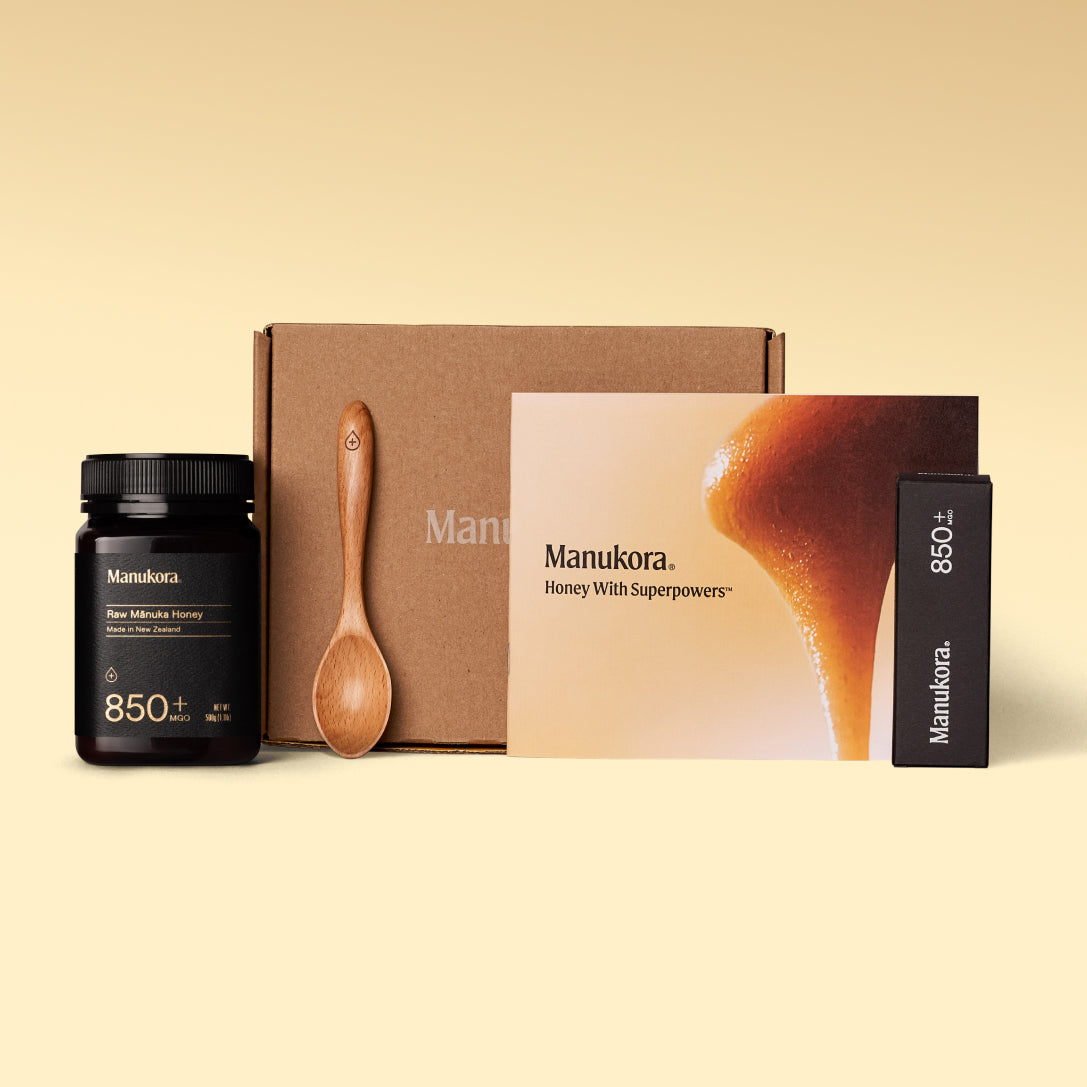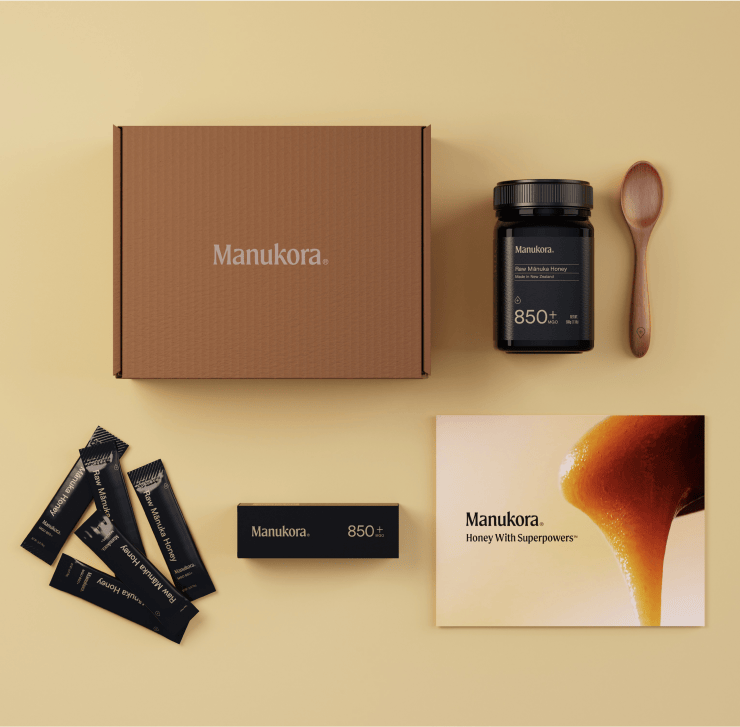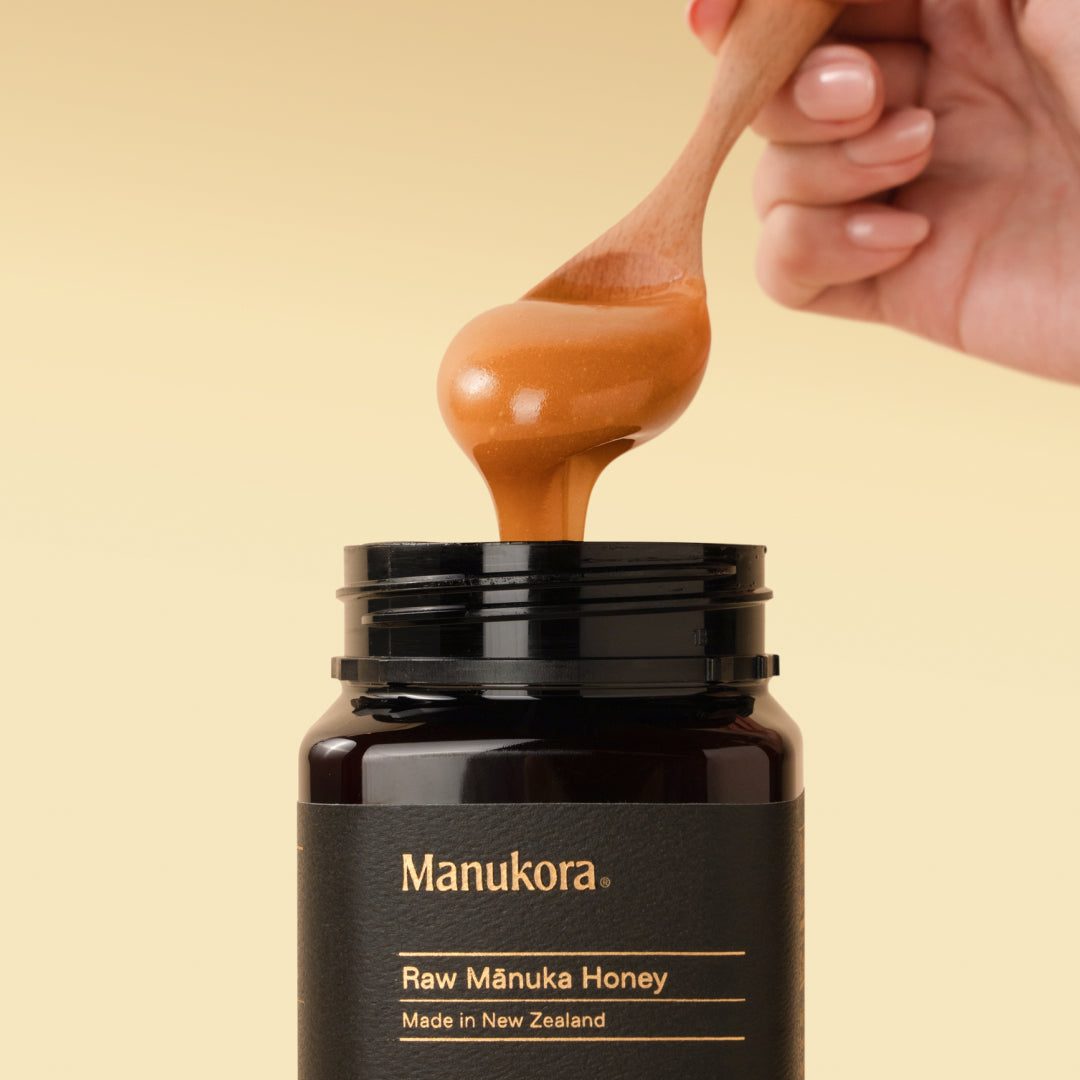Executive Summary
-
Individuals monitoring blood sugar such as those managing diabetes should be mindful of their carbohydrate intake, as different types of carbohydrates can affect glucose levels in different ways.
-
Manuka honey contains natural sugars (glucose and fructose), along with trace vitamins, minerals, amino acids, and antioxidants offering more complexity than refined sugar.
-
It typically has a lower glycemic index than table sugar, which may result in a more gradual rise in blood glucose when consumed mindfully.
-
Unique compounds like MGO and Leptosperin contribute to Manuka honey’s supportive role in microbial and antioxidant balance.
-
While Manuka honey can be a flavorful and naturally sourced alternative, it’s important to enjoy it in moderation and consult with a healthcare professional when managing specific health needs.
Honey and Diabetes: Is It a Safe Sweetener?
Managing blood sugar is a daily priority for millions of people living with diabetes—and dietary choices play a key role in that journey.
Since carbohydrates have a direct impact on blood glucose, sweeteners are often one of the first things people reconsider when adjusting their meals.
While simple carbohydrates, such as sugar and honey, are digested more quickly than complex carbs, not all sweeteners are created equal.
Most commercial honey is derived from sources like clover or orange blossom, but it may also contain added syrups or undergo high-heat pasteurization that affects its natural properties.
Manuka honey, by contrast, is a single-origin, minimally processed honey known for its traceable source and naturally occurring compounds like MGO (methylglyoxal). Although it still contains glucose and fructose—as all honey does—it offers a more intentional, whole-food alternative for those exploring mindful ways to enjoy sweetness.
In this article, we’ll take a closer look at how honey compares to refined sugar for those monitoring their carbohydrate intake, and what makes Manuka honey a distinct option worth understanding.
Honey's Nutritional Profile
At its core, honey is made up of natural sugars (primarily glucose and fructose) and water. However, high-quality honey, such as Manuka honey—also contains naturally occurring trace nutrients, including small amounts of vitamins, minerals, amino acids, antioxidants, and prebiotics. These elements contribute to its complexity as a whole-food sweetener.
Manuka honey is especially known for MGO (methylglyoxal), a unique compound that distinguishes it from other honeys. While all honey contains some beneficial compounds, the levels and quality can vary significantly based on origin, processing, and purity.
One way to evaluate how honey may affect blood sugar is by looking at its glycemic index (GI)—a scale that measures how quickly carbohydrates raise blood glucose levels:
|
Sweetener |
Glycemic Index (GI) |
|
Table Sugar |
~65 |
|
Store-Bought Honey |
~61 |
|
Manuka Honey |
~54–59 (varies by batch) |
Although honey still contains natural sugars, its slightly lower GI compared to refined sugar means it may cause a more gradual rise in blood sugar when used in moderation. That said, it’s still a carbohydrate and should be factored into any dietary plan involving blood glucose management.
Manuka honey offers more than sweetness—its unique composition, including MGO, gives it a depth that refined sugars lack. — Manukora Editorial Team
The Impact of Honey on Blood Sugar Levels
Honey, particularly raw, high-quality varieties like Manuka honey—contains glucose and fructose, the two primary natural sugars. These sugars, when consumed in moderation, are processed differently by the body than refined table sugar, which may lead to a more gradual rise in blood glucose.
Because of its lower glycemic index (GI) compared to table sugar, honey may provide a slower, more sustained source of energy. This makes it a point of interest for individuals looking to manage their energy levels or reduce blood sugar spikes after meals.
Some studies suggest that fructose can assist in how the liver processes glucose, potentially helping with more stable blood sugar responses when compared to high-GI sweeteners. Additionally, Manuka honey contains naturally occurring antioxidants, which support overall cellular health when part of a balanced lifestyle.
That said, honey is still a simple carbohydrate and should be consumed mindfully—especially by those monitoring their carbohydrate intake or managing blood sugar-related health concerns.
Manuka honey offers a balanced combination of glucose and fructose, delivering energy with a naturally lower glycemic impact than table sugar.
Manuka Honey: A Special Consideration
Manuka honey is a unique variety of honey produced by bees that forage the nectar of the native Manuka tea tree, found primarily in remote regions of New Zealand.
What sets it apart is not just its origin—but its rich composition, including naturally occurring compounds like MGO (methylglyoxal) and Leptosperin, which contribute to its distinctive character.
MGO is a key marker that supports microbial balance, while Leptosperin is a naturally occurring antioxidant found only in Manuka honey. These compounds, alongside trace nutrients and a dense, creamy texture, make Manuka honey a meaningful choice for those who value both flavor and function.
At Manukora, we believe honey should be as pure, transparent, and ethically made as possible:
-
Our honey is traceable to source through a QR code on every jar—you can even meet the beekeeper who harvested your batch.
-
We practice The Art of Ethical Beekeeping™, minimizing hive disruption and never relocating our bees.
-
Our process is environmentally conscious—from recycled packaging to eco-inks, reusable jars, and reforestation efforts.
-
Every batch is third-party tested to verify its MGO content and authenticity, and contains no GMOs, pesticides, or sprays.
For those making thoughtful choices especially when managing energy intake or seeking a more natural sweetener Manuka honey offers depth, quality, and integrity in every spoonful.
Manuka honey is more than a sweetener—it's a story of nature, care, and conscious craftsmanship.
Recommendations for Diabetics Considering Honey
Honey is a natural sweetener, but like all sources of carbohydrates, it can impact blood glucose especially for individuals who are monitoring their intake closely. That’s why moderation and personal awareness are essential when choosing to include it in your lifestyle.
If you’re considering adding Manuka honey to your routine, here are a few mindful strategies that can help you enjoy it intentionally:
-
Start Small: Begin with a small amount and observe how your body responds. Everyone processes natural sugars differently, so personal experience is key.
-
Pair with Protein or Fiber: Combining honey with nutrient-rich foods like protein and fiber may help slow digestion and create a more balanced energy release.
Ideas to try: -
A drizzle over Greek yogurt and seeds
-
Paired with sliced vegetables and creamy goat cheese
-
Mixed into a marinade for roasted chicken and root vegetables
-
Stay Active: Movement after meals like a walk or light stretching can help the body use energy more effectively and support overall well-being.
Above all, everyone’s nutritional needs are different. If you're managing a health condition or have specific dietary goals, it's always best to speak with your healthcare provider before making changes. They can help you determine whether incorporating honey aligns with your individual plan.
Honey can be part of a balanced routine when consumed mindfully, what matters most is how it fits into your body’s needs.
FAQs
Can people with diabetes eat honey?
Honey contains natural sugars and carbohydrates, so it should be consumed in moderation by individuals managing blood sugar. It’s best to consult with a healthcare provider to determine whether honey fits into your personal nutrition plan.
Is Manuka honey better than regular honey for blood sugar?
Manuka honey typically has a lower glycemic index than many store-bought honeys and contains naturally occurring compounds like MGO. While it still contains sugar, its composition may offer a more gradual energy release when used mindfully.
How much honey is safe to consume if you're watching your blood sugar?
If you're monitoring blood sugar, starting with a small amount such as a teaspoon—may help you assess your body’s response. Always consult with a medical professional before making dietary changes.
Does honey raise blood sugar more slowly than sugar?
Honey often has a slightly lower glycemic index than table sugar, which means it may raise blood glucose more gradually. However, both are forms of sugar and impact blood sugar levels.
What’s the glycemic index of Manuka honey?
Manuka honey generally ranges between GI 54 to 59, depending on the batch and processing. This is lower than table sugar (GI ~65) and some commercial honeys (GI ~61).
Can honey be part of a diabetes-friendly diet?
In some cases, yes, but only with portion control, mindful pairing with nutrient-dense foods, and professional guidance. Everyone’s body responds differently to natural sugars like those found in honey.
In Summary…
For those who are monitoring blood sugar whether due to diabetes or personal wellness goals including honey in the diet requires mindful consideration. While Manuka honey is a natural sweetener with trace nutrients and unique compounds like MGO, it is still a carbohydrate and should be consumed with awareness of individual responses.
A small amount, such as a teaspoon added to your favorite food or beverage, may be a satisfying way to enjoy natural sweetness especially when paired with nutrient-dense foods and an active lifestyle.
As always, if you have a pre-existing health condition or specific dietary needs, it’s important to consult with your healthcare provider to determine if honey fits into your plan.
Explore Manukora’s range of MGO-verified, traceable Manuka honeys—crafted with care using sustainable practices and ethical beekeeping.


















